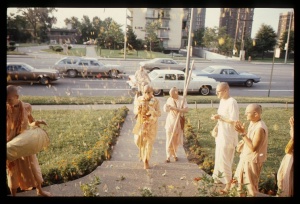BG 2.10: Difference between revisions
m (1 revision(s)) |
(Vanibot #0020 edit - link to the Version Compare feature) |
||
| Line 1: | Line 1: | ||
{{ | [[Category:Bhagavad-gita As It Is (1983+) - Chapter 02]] | ||
<div style="float:left">'''[[Bhagavad-gita As It Is (1983+)]] - [[BG 2 (1983+)|Chapter 2: Contents of the Gita Summarized]]'''</div> | |||
<div style="float:right">[[File:Go-previous.png|link=BG 2.9]] '''[[BG 2.9]] - [[BG 2.11]]''' [[File:Go-next.png|link=BG 2.11]]</div> | |||
{{CompareVersions|BG|2.10|BG 1972|BG 1983+}} | |||
{{RandomImage}} | |||
==== TEXT 10 ==== | ==== TEXT 10 ==== | ||
<div class="devanagari"> | |||
:तमुवाच हृषीकेशः प्रहसन्निव भारत । | |||
:सेनयोरुभयोर्मध्ये विषीदन्तमिदं वचः ॥१०॥ | |||
</div> | |||
<div | <div class="verse"> | ||
:tam uvāca hṛṣīkeśaḥ | |||
:prahasann iva bhārata | |||
:senayor ubhayor madhye | |||
:viṣīdantam idaṁ vacaḥ | |||
</div> | </div> | ||
==== SYNONYMS ==== | ==== SYNONYMS ==== | ||
<div class="synonyms"> | |||
<div | ''tam''—unto him; ''uvāca''—said; ''hṛṣīkeśaḥ''—the master of the senses, Kṛṣṇa; ''prahasan''—smiling; ''iva''—like that; ''bhārata''—O Dhṛtarāṣṭra, descendant of Bharata; ''senayoḥ''—of the armies; ''ubhayoḥ''—of both parties; ''madhye''—between; ''viṣīdantam''—unto the lamenting one; ''idam''—the following; ''vacaḥ''—words. | ||
</div> | </div> | ||
==== TRANSLATION ==== | ==== TRANSLATION ==== | ||
<div class="translation"> | |||
<div | |||
O descendant of Bharata, at that time Kṛṣṇa, smiling, in the midst of both the armies, spoke the following words to the grief-stricken Arjuna. | O descendant of Bharata, at that time Kṛṣṇa, smiling, in the midst of both the armies, spoke the following words to the grief-stricken Arjuna. | ||
</div> | </div> | ||
==== PURPORT ==== | |||
= | <div class="purport"> | ||
The talk was going on between intimate friends, namely the Hṛṣīkeśa and the Guḍākeśa. As friends, both of them were on the same level, but one of them voluntarily became a student of the other. Kṛṣṇa was smiling because a friend had chosen to become a disciple. As Lord of all, He is always in the superior position as the master of everyone, and yet the Lord agrees to be a friend, a son, or a lover for a devotee who wants Him in such a role. But when He was accepted as the master, He at once assumed the role and talked with the disciple like the master—with gravity, as it is required. It appears that the talk between the master and the disciple was openly exchanged in the presence of both armies so that all were benefited. So the talks of ''Bhagavad-gītā'' are not for any particular person, society, or community, but they are for all, and friends or enemies are equally entitled to hear them. | |||
</div> | |||
<div | <div style="float:right; clear:both;">[[File:Go-previous.png|link=BG 2.9]] '''[[BG 2.9]] - [[BG 2.11]]''' [[File:Go-next.png|link=BG 2.11]]</div> | ||
__NOTOC__ | |||
</div> | __NOEDITSECTION__ | ||
__NOTOC__ | |||
Revision as of 20:54, 7 December 2017

A.C. Bhaktivedanta Swami Prabhupada
TEXT 10
- तमुवाच हृषीकेशः प्रहसन्निव भारत ।
- सेनयोरुभयोर्मध्ये विषीदन्तमिदं वचः ॥१०॥
- tam uvāca hṛṣīkeśaḥ
- prahasann iva bhārata
- senayor ubhayor madhye
- viṣīdantam idaṁ vacaḥ
SYNONYMS
tam—unto him; uvāca—said; hṛṣīkeśaḥ—the master of the senses, Kṛṣṇa; prahasan—smiling; iva—like that; bhārata—O Dhṛtarāṣṭra, descendant of Bharata; senayoḥ—of the armies; ubhayoḥ—of both parties; madhye—between; viṣīdantam—unto the lamenting one; idam—the following; vacaḥ—words.
TRANSLATION
O descendant of Bharata, at that time Kṛṣṇa, smiling, in the midst of both the armies, spoke the following words to the grief-stricken Arjuna.
PURPORT
The talk was going on between intimate friends, namely the Hṛṣīkeśa and the Guḍākeśa. As friends, both of them were on the same level, but one of them voluntarily became a student of the other. Kṛṣṇa was smiling because a friend had chosen to become a disciple. As Lord of all, He is always in the superior position as the master of everyone, and yet the Lord agrees to be a friend, a son, or a lover for a devotee who wants Him in such a role. But when He was accepted as the master, He at once assumed the role and talked with the disciple like the master—with gravity, as it is required. It appears that the talk between the master and the disciple was openly exchanged in the presence of both armies so that all were benefited. So the talks of Bhagavad-gītā are not for any particular person, society, or community, but they are for all, and friends or enemies are equally entitled to hear them.